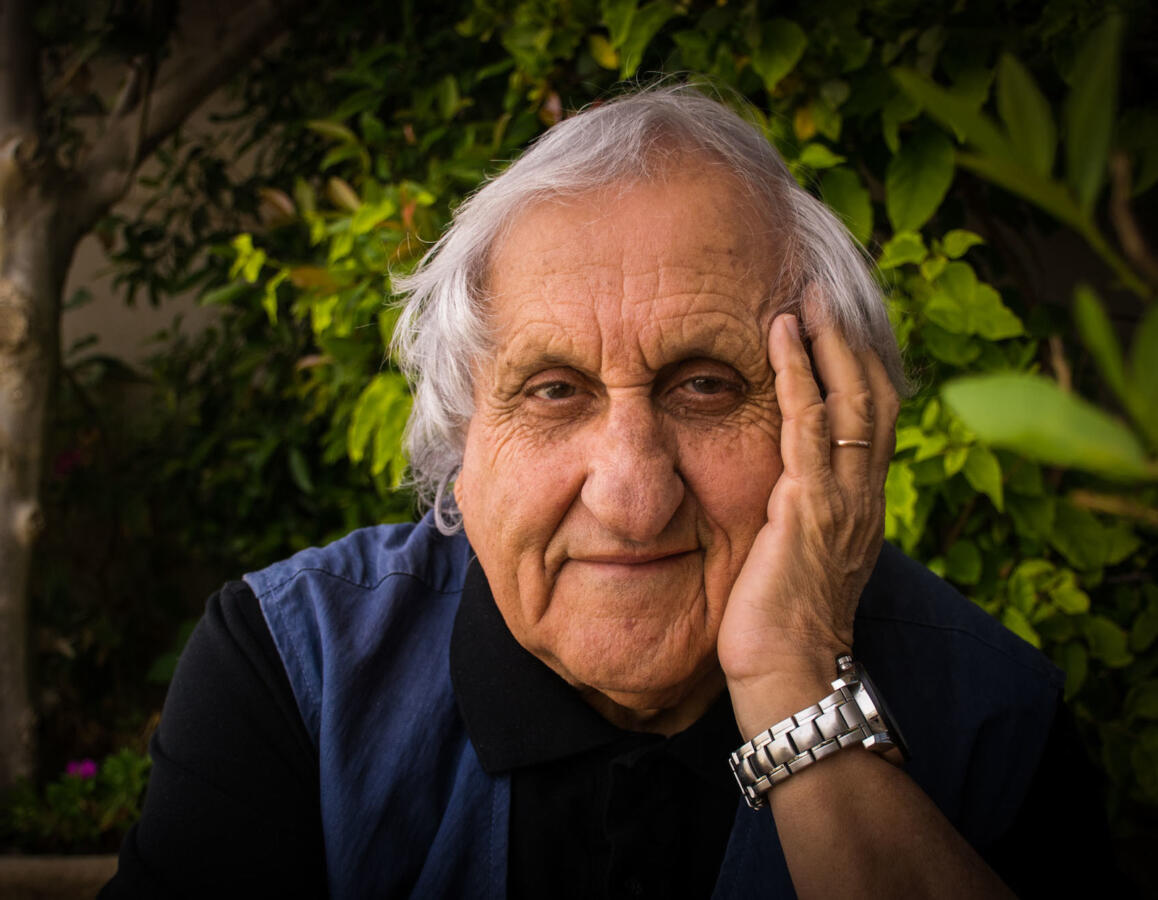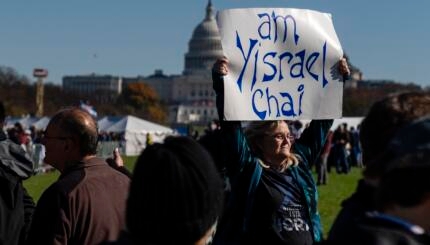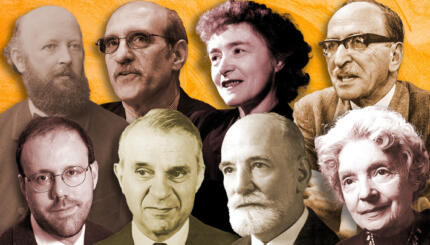Note: A.B. Yehoshua died on June 14, 2022 at age 85. This biography was written prior to his death. Read his obituary in the Jewish Telegraphic Agency here.
A.B. Yehoshua is one of Israel’s leading contemporary authors, and one of the most widely published Israeli writers. His works have been translated into 28 languages, and he is the recipient of the Bialik Prize, the Israel Prize for Literature, and the Los Angeles Times Book Prize.
Yehoshua’s stories are deeply rooted in the landscape and culture of Israel, often holding a mirror to Israeli society, yet they are also universal in their scope, which contributes to their global appeal.
Avraham “Boolie” Yehoshua was born in Palestine in 1936, a fifth-generation Jerusalemite. Following his formal education at The Hebrew University, where he studied literature and philosophy, Yehoshua moved to Paris for four years.

Help us keep Jewish knowledge accessible to millions of people around the world.
Your donation to My Jewish Learning fuels endless journeys of Jewish discovery. With your help, My Jewish Learning can continue to provide nonstop opportunities for learning, connection and growth.
In 1967 Yehoshua returned to Israel and served as a paratrooper during the Six Day War. Today he resides in Haifa, where he has been a senior lecturer in literature at the University of Haifa since 1972.
While a strong believer in the legitimacy of Israel’s existence, he is quick to hold his homeland up to a high standard when it comes to moral behavior. Yehoshua has written about his frustration with corrupt government figures and criticized the Jewish settlers in the West Bank.
A Provocative Body of Work
Yehoshua’s stories often have several protagonists and are often told in multiple first-person accounts. This leaves room for overlapping narrative as well as ambiguity at the novel’s end as the characters’ individual stories do not present a unified conclusion, leaving the final assessment up to the readers. He is also credited with being among the first to give voice to an Arab character in post-1948 Israeli literature.
Yehoshua’s first novel, The Lover (1977), is composed of five accounts of a single storyline. Set in the aftermath of the War, Adam, a middle-aged Israeli with a wife and daughter, searches for his wife’s lover–the novel’s namesake–who disappeared amidst the chaos of battle. Through Adam’s quest a dramatic series of events unfold, exposing tension on all fronts: among family, between generations, between Jews and Arabs, and amid the overall landscape of Israel.
Using individual and distinct monologues to tell a story, Yehoshua creates an opportunity for each voice to be heard on its own equal terms, including Naim, a young Arab boy from the nearby village. Additionally, this narrative structure allows each character to propel the story in a different direction–sometimes responding to other characters and other times existing independently.
In The Late Divorce (1982), Yehoshua employs a similar style. Spanning the 10 days before Passover, the story revolves around an aging couple seeking a divorce and the impact this has on their family. The novel plays with social mores, leaving readers uncomfortable with the brash honesty of Yehoshua’s characters’ words.
With the family gathered at a restaurant, Kedmi–the son-in-law of the man seeking the divorce–says to their Arab waiter: “Grandpa is leaving Israel. Aren’t you glad? There’ll be one less of us here.” The waiter responds: “The gentleman can’t be serious. Kedmi, in turn, says: “Maybe it’s not so bad for you… After all, you people think you own it.”
While The Late Divorce only spans a week and a half, Mr. Mani runs six generations deep into the Mani family, told through five different conversations about a Mr. Mani, each of whom has a relationship with the city of Jerusalem. Representing Jewish continuity over time and place, the novel also reminds us of how scattered the Jewish experience has been as the storyline moves around the world.
(Re)writing History
In one of his earlier works, Yehoshua explains the importance of an honest account of history, even if it means engaging with a difficult and at times unfavorable past, in order to establish a just society. In the short story “Facing the Forests” (1962), Yehoshua raises the question of Israel’s history, pushing readers to ask what is being covered up, urging the exposure of truth, regardless of how hard it may be.
While Yehoshua’s fiction writing is nuanced, his public opinions are far less subtle. He speaks openly on the subject of a Palestinian state and the need to dismantle Jewish settlements in the West Bank. Yehoshua has been criticized in certain literary circles for his inability to affect the change he often speaks of, but it is impossible to ignore the intellectual dialogue his words have generated.
“Being Israeli is my skin”
When he was invited to speak at the American Jewish Committee’s Centennial Symposium in May of 2006, Yehoshua remarked that “being Israeli is my skin, it’s not my jacket.” Implied in his remarks was the idea that Diaspora Jews could “put on” or “take off” their Jewish identity when it’s convenient, but that Israeli Jewish identity involved no choice. Many of the symposium’s attendees had heated reactions. Yehoshua later clarified in an AJC-published article:
Jewish-Israeli identity has to contend with all the elements of life via the binding and sovereign framework of a territorially defined state. And therefore the extent of its reach into life is immeasurably fuller and broader and more meaningful than the Jewishness of an American Jew, whose important and meaningful life decisions are made within the framework of American nationality or citizenship. His Jewishness is voluntary and deliberate, and he may calibrate its pitch in accordance with his needs.
The meaning of Jewish identity concerns Yehoshua, who believes it needs to be rooted in something more meaningful than the graves of the Jewish forefathers and foremothers:
Our Chateaux de la Loire, our Louvre, our Florence, our Michelangelo are texts. Our Louis Seize chair is a text.… [T]he Jews lived a thousand years in Poland, and what are the signs that they were there? Graveyards and texts. And so it is in texts that even the nonreligious must go to find their essence and their history.



